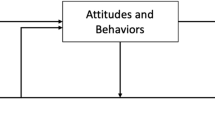Abstract
In this article we present a process model we have developed for interaction and mathematical level raising. In the process model the focus is on the individual learning process. The model is based on our own research experience and our common interest in individual learning processes. We relate it to other research. The model is meant to show how level raising can be realised by letting students work in small groups on a mathematical problem.
Similar content being viewed by others
REFERENCES
Balacheff, N.: 1991, 'Treatment of refutations: Aspects of the complexity of a constructivist approach to mathematics learning', in E. von Glasersfeld (ed.), Radical Constructivism in Mathematics Education, Kluwer Academic Publishers, Dordrecht, pp. 89-110.
BartoliniBussi, M.: 1991, 'Social interaction and mathematical knowledge', in F. Furinghetti (ed.), Proceedings of the Fifteenth International Conference for the Psychology of Mathematics Education 1, PME, Assisi, pp. 116.
Bauersfeld, H.: 1988, 'Interaction, construction and knowledge: Alternative perspectives for mathematics education', in T. Cooney & D. Grouws (eds.), Effective mathematics teachingNational Council of Teachers of Mathematics, Reston, Virginia, pp. 27-46.
Chi, M. T. H., De Leeuw, N., Chiu, M., and LaVancher C.: 1994, 'Eliciting self-explanations improves understanding', Cognitive Science 18, 439-477.
Chinn, C. A. & Brewer, W. F.: 1993, 'The role of anomalous data in knowledge acquisition: A theoretical framework and implications for science instruction', Review of Educational Research 63, 1-49.
Cobb, P., Yackel, E. and Wood, T.: 1992, 'Interaction and learning in mathematics classroom situations', Educational Studies in Mathematics 23, 99-122.
Cobb, P.: 1996, 'Constructivism and learning', in E. De Corte & F. E. Weinert (eds.), International Encyclopedia of Developmental and Instructional Psychology.Pergamon, Oxford, pp. 228-341.
Cockroft, W., et al.: 1982, Mathematics Counts, H.M.S.O., London.
Dekker, R.: 1987, 'Roos and José, two children in a mixed ability group', Educational Studies in Mathematics 18, 317-324.
Dekker, R.: 1991, Wiskunde leren in kleine heterogene groepen, Academisch Boeken Centrum, De Lier.
Dekker, R.: 1994, 'Graphs, small groups and the process of level raising', in A. Antibi (ed.), Représentations graphique et symbolique de la Maternelle à l'Université, Tome 1 .CIEAEM, Université Paul Sabatier, Toulouse, pp. 184-189.
Dekker, R.: 1995, 'Learning mathematics in small heterogeneous groups', L'educazione Matematica 16, 9-19.
Dekker, R. & ElshoutMohr, M.: 1996, 'Zelfstandig leren doe je niet alleen', Tijdschrift voor nascholing en onderzoek van het rekenwiskundeonderwijs 15, 20-27.
Freudenthal, H.: 1978, Weeding and Sowing, Reidel, Dordrecht.
Hoyles, C.: 1985, 'What is the point of group discussion in mathematics?', Educational Studies in Mathematics 16, 205-214.
Kilpatrick, J.: 1985, 'Reflection and recursion', Educational Studies in Mathematics 16, 1-26.
Pirie, S. E. B. & Schwarzenberger, R. L. E.: 1988, 'Mathematical discussion and mathematical understanding', Educational Studies in Mathematics 19, 459-470.
Vollmer, N. & Krummheuer, G.: (in print), 'Anfangen-Schreiben-Machen-Helfen. Zur Beziehung zwischen Arbeitsteilung und Aufgabenverständnis während einer Partnerarbeit im Mathematikunterricht', Journal f ür Mathematikdidaktik.
Vosniadou, S.: 1994, 'Capturing and modeling the process of conceptual change', Learning and Instruction 4, 45-69.
Webb, N. M.: 1991, 'Task-related verbal interaction and mathematics learning in small groups', Journal for Research in Mathematics Education 22, 366-389.
Webb, N. M. & Palincsar, A. S.: 1996, 'Group processes in the classroom', in D. C. Berliner & R. C. Calfee (eds.), Handbook of Educational PsychologySimon & Schuster Macmillan, New York, pp. 841-873.
Wistedt, I.: 1994, 'Reflection, communication, and learning mathematics: A case study', Learning and Instruction 4, 123-138.
Wood, T.: 1996, 'Events in Learning Mathematics: Insights from Research in Classrooms', Educational Studies in Mathematics 30, 85-105.
Yackel, E, Cobb, P. and Wood, T.: 1991, 'Small-group interactions as a source of learning opportunities in second-grade mathematics', Journal for Research in Mathematics Education 22, 390-408.
Author information
Authors and Affiliations
Rights and permissions
About this article
Cite this article
Dekker, R., Elshout-Mohr, M. A Process Model for Interaction and Mathematical Level Raising. Educational Studies in Mathematics 35, 303–314 (1998). https://doi.org/10.1023/A:1003187204737
Issue Date:
DOI: https://doi.org/10.1023/A:1003187204737




